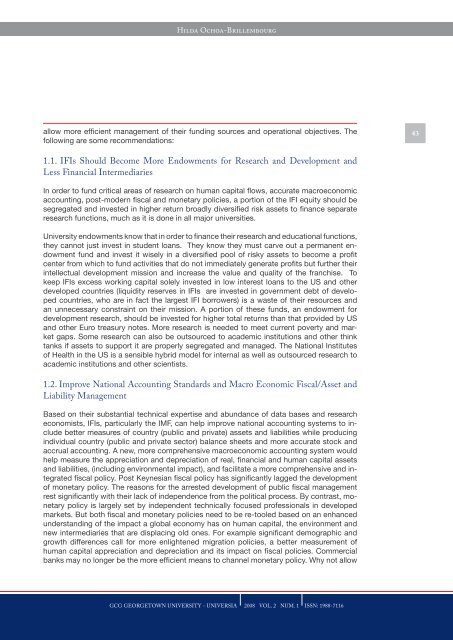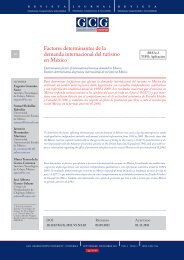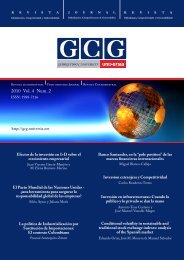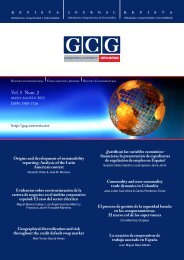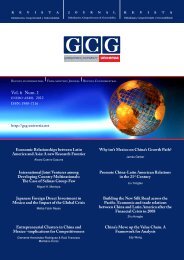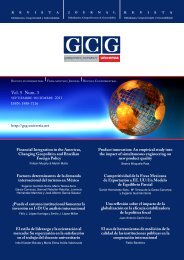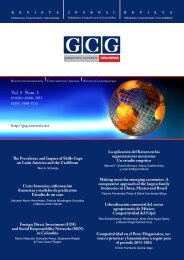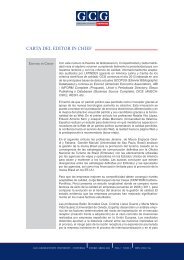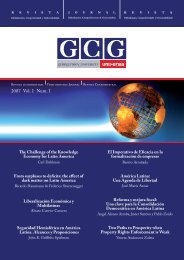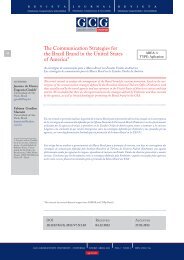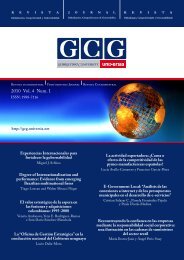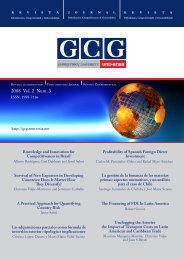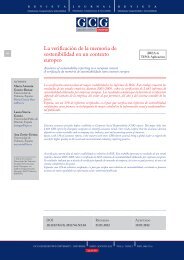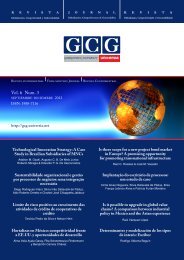Addressing New Global Gaps: Re-Inventing the International Financial Institutions42their role as financial intermediaries channeling new lending and investment has been dwarfedby private sector intermediaries. Furthermore, as they increased their lending efficiencies,their research functions became secondary to their lending operations. It could be saidthat their success in fostering open economies, <strong>de</strong>regulation and tra<strong>de</strong>, has driven themaway from their initial mission: addressing intellectual and market gaps in a global cooperativeeconomy based on fundamental research coupled with strong financial incentives.Adoption of open economy mo<strong>de</strong>ls and price <strong>de</strong>regulation have allowed vastly expan<strong>de</strong>dtra<strong>de</strong> and economic growth in emerging economies, access to private capital markets andreduced <strong>de</strong>pen<strong>de</strong>nce on IFIs. Official flows from IFIs have been (net) negative since at least2004, as emerging countries pay more <strong>de</strong>bt than they create. There could not have beena better outcome. With fairly good access to global tra<strong>de</strong> and capital, emerging countryborrowers, like Japan in the 1950s, have begun to repay their <strong>de</strong>bts to IFIs. In 2006 the netcapital flows to emerging markets were $502 billion. IFIs net lending was negative $26 billionin 2006 and negative $40 billion in 20051. The capital market gap these institutions helpedfill is no longer significant, except for a few small countries and regimes. But their missionhas not en<strong>de</strong>d.Today there are new important gaps to address. There are substantive policy and marketgaps that if properly addressed would help reduce growing income disparities and unevenaccess to capital markets of the world’s poorest: Access to home ownership, to growing labormarkets, to credit markets by <strong>de</strong>serving NGOs and to critical information by major policymakers. Maybe the existing institutions can address these gaps; maybe they cannot andnew ones need to be created to breach current capital, labor, <strong>de</strong>mographic, and informationgaps. That is a relevant question, but I strongly believe the IFIs can be retooled to meet newglobal needs.Despite sub-prime thun<strong>de</strong>rbolts and significant losses among a few large banking groups,which have impacted the world economic growth outlook for <strong>2008</strong>, the medium term financialoutlook is still one of abundant liquidity, contained inflation, continued international tra<strong>de</strong>and capital flows, relatively low risk premiums, and increased need for cross-bor<strong>de</strong>r humancapital mobility to tend to differential growth rates among countries and contrasting <strong>de</strong>mographicprofiles. There are, however, significant threats to human capital mobility and worldprosperity: Heightened terrorism, nuclear risks, ageing populations in some of the world’sgrowth engines, politically motivated and sometimes rogue international public lending, theemotionally charged and ubiquitous global warming/climate-change, growing concernsabout water scarcity and potential pan<strong>de</strong>mic challenges. Any of these threats could bringabout protectionist, populist, mercantilist, feudal or outright regressive policies.There is clearly a need to adapt the IMF, The World Bank Group, Inter-American DevelopmentBank, Asian Development Bank, and the 50+ other IFIs to address the current capitalmarket and knowledge gaps, if they can. They have the capital and knowledge base to doso, but they need the will and constructive lea<strong>de</strong>rship to re-focus their mission. These institutionsneed to separate financial intermediation functions from research activities, in or<strong>de</strong>rto offer more enlightened actions in both realms. Separation of the two functions would1. Institute of International Finance<strong>GCG</strong> GEORGETOWN UNIVERSITY - UNIVERSIA <strong>2008</strong> VOL. 2 NUM. 1 ISSN: 1988-7116
Hilda Ochoa-Brillembourgallow more efficient management of their funding sources and operational objectives. Thefollowing are some recommendations:431.1. IFIs Should Become More Endowments for Research and Development andLess Financial IntermediariesIn or<strong>de</strong>r to fund critical areas of research on human capital flows, accurate macroeconomicaccounting, post-mo<strong>de</strong>rn fiscal and monetary policies, a portion of the IFI equity should besegregated and invested in higher return broadly diversified risk assets to finance separateresearch functions, much as it is done in all major universities.University endowments know that in or<strong>de</strong>r to finance their research and educational functions,they cannot just invest in stu<strong>de</strong>nt loans. They know they must carve out a permanent endowmentfund and invest it wisely in a diversified pool of risky assets to become a profitcenter from which to fund activities that do not immediately generate profits but further theirintellectual <strong>de</strong>velopment mission and increase the value and quality of the franchise. Tokeep IFIs excess working capital solely invested in low interest loans to the US and other<strong>de</strong>veloped countries (liquidity reserves in IFIs are invested in government <strong>de</strong>bt of <strong>de</strong>velopedcountries, who are in fact the largest IFI borrowers) is a waste of their resources andan unnecessary constraint on their mission. A portion of these funds, an endowment for<strong>de</strong>velopment research, should be invested for higher total returns than that provi<strong>de</strong>d by USand other Euro treasury notes. More research is nee<strong>de</strong>d to meet current poverty and marketgaps. Some research can also be outsourced to aca<strong>de</strong>mic institutions and other thinktanks if assets to support it are properly segregated and managed. The National Institutesof Health in the US is a sensible hybrid mo<strong>de</strong>l for internal as well as outsourced research toaca<strong>de</strong>mic institutions and other scientists.1.2. Improve National Accounting Standards and Macro Economic Fiscal/Asset andLiability ManagementBased on their substantial technical expertise and abundance of data bases and researcheconomists, IFIs, particularly the IMF, can help improve national accounting systems to inclu<strong>de</strong>better measures of country (public and private) assets and liabilities while producingindividual country (public and private sector) balance sheets and more accurate stock andaccrual accounting. A new, more comprehensive macroeconomic accounting system wouldhelp measure the appreciation and <strong>de</strong>preciation of real, financial and human capital assetsand liabilities, (including environmental impact), and facilitate a more comprehensive and integratedfiscal policy. Post Keynesian fiscal policy has significantly lagged the <strong>de</strong>velopmentof monetary policy. The reasons for the arrested <strong>de</strong>velopment of public fiscal managementrest significantly with their lack of in<strong>de</strong>pen<strong>de</strong>nce from the political process. By contrast, monetarypolicy is largely set by in<strong>de</strong>pen<strong>de</strong>nt technically focused professionals in <strong>de</strong>velopedmarkets. But both fiscal and monetary policies need to be re-tooled based on an enhancedun<strong>de</strong>rstanding of the impact a global economy has on human capital, the environment andnew intermediaries that are displacing old ones. For example significant <strong>de</strong>mographic andgrowth differences call for more enlightened migration policies, a better measurement ofhuman capital appreciation and <strong>de</strong>preciation and its impact on fiscal policies. Commercialbanks may no longer be the more efficient means to channel monetary policy. Why not allow<strong>GCG</strong> GEORGETOWN UNIVERSITY - UNIVERSIA <strong>2008</strong> VOL. 2 NUM. 1 ISSN: 1988-7116
- Page 1 and 2: Revista cuatrimestral Four-monthly
- Page 3 and 4: En el segundo artículo, Andrés Op
- Page 6 and 7: SUMARIO SUMMARY SUMÁRIO1ÚAmérica
- Page 8 and 9: StaffUniversity, EEUUEdwards, Sebas
- Page 10: StaffMario Cimoli, Technology and i
- Page 13 and 14: Libros: Dornier, P.P.; Ertns, R.; F
- Page 15 and 16: GCG- Each article will be submitted
- Page 17 and 18: GCGGCG GEORGETOWN UNIVERSITY - UNIV
- Page 19 and 20: 1. América Latina: la coyuntura ac
- Page 21 and 22: Bernardo Kosacoff y Andrés LopezAc
- Page 23 and 24: Bernardo Kosacoff y Andrés Lopezso
- Page 25 and 26: Bernardo Kosacoff y Andrés Lopez3.
- Page 27 and 28: Bernardo Kosacoff y Andrés Lopezva
- Page 29 and 30: Bernardo Kosacoff y Andrés Lopezaf
- Page 31 and 32: Bernardo Kosacoff y Andrés LopezBi
- Page 33 and 34: Bernardo Kosacoff y Andrés Lopez33
- Page 35 and 36: United States and Europe have becom
- Page 37 and 38: Andres Oppenheimer2,800, Chile 1570
- Page 39 and 40: Andres Oppenheimer39GCG GEORGETOWN
- Page 41: experiments we quantified the destr
- Page 45 and 46: Hilda Ochoa-Brillembourg1.3. Help C
- Page 47 and 48: Hilda Ochoa-Brillembourg2. Why the
- Page 49 and 50: with a number of empires in other h
- Page 51 and 52: Josep M. Colomertial violence, forc
- Page 53 and 54: Josep M. ColomerIn contrast, ‘sta
- Page 55 and 56: Josep M. Colomeroverlapping institu
- Page 57 and 58: Josep M. ColomerReferences57Badie,
- Page 59 and 60: Josep M. Colomer59GCG GEORGETOWN UN
- Page 61 and 62: países con regimenes democráticos
- Page 63 and 64: Beatriz M. Ramacciottiel ámbito mu
- Page 65 and 66: Beatriz M. Ramacciottimiembro de lo
- Page 67 and 68: Beatriz M. RamacciottiEl nuevo esce
- Page 69 and 70: Beatriz M. RamacciottiComo dicen al
- Page 71 and 72: Beatriz M. Ramacciottiobservaciones
- Page 73 and 74: Beatriz M. Ramacciotti73GCG GEORGET
- Page 75 and 76: del entorno global (Prats i Catalá
- Page 77 and 78: Manuel F. Suarez-Barraza y Juan Ram
- Page 79 and 80: Manuel F. Suarez-Barraza y Juan Ram
- Page 81 and 82: Manuel F. Suarez-Barraza y Juan Ram
- Page 83 and 84: Manuel F. Suarez-Barraza y Juan Ram
- Page 85 and 86: Manuel F. Suarez-Barraza y Juan Ram
- Page 87 and 88: Manuel F. Suarez-Barraza y Juan Ram
- Page 89 and 90: de los países del mundo, utilizan
- Page 91 and 92: Daniel Correa SabatPor su parte, y
- Page 93 and 94:
Daniel Correa SabatPara efectos de
- Page 95 and 96:
Daniel Correa Sabaten la contrataci
- Page 97 and 98:
Daniel Correa Sabaten definitiva, g
- Page 99 and 100:
Daniel Correa SabatReferencias99ANG
- Page 101 and 102:
filantropía a nivel local, son tod
- Page 103 and 104:
Francesco D. Sandulli3. Estrategias
- Page 105 and 106:
Francesco D. SandulliTabla 1: Medic
- Page 107 and 108:
Francesco D. SandulliTal y como se
- Page 109 and 110:
Francesco D. SandulliEn el segundo
- Page 111:
Francesco D. SandulliBibliografía1


